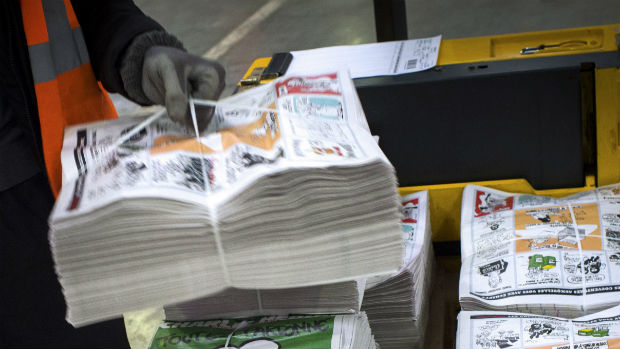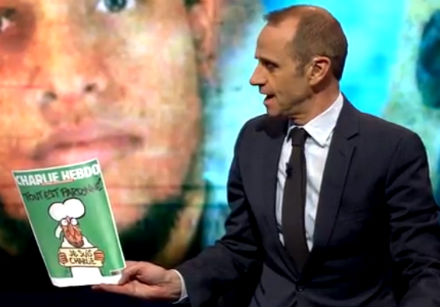Charlie Hebdo Mohammed cover is 'an act of war'
Anjem Choudary hits out at cartoon, but others describe it as 'gentle' by Charlie Hebdo standards

A free daily email with the biggest news stories of the day – and the best features from TheWeek.com
You are now subscribed
Your newsletter sign-up was successful
This week's Charlie Hebdo magazine, which sold out before dawn in Paris today, continues to fuel the debate over free speech and religious sensitivities.
There were long queues at newsstands in France as people rushed to buy the first edition of the satirical magazine to be published since two Islamist extremists launched an attack on its offices, killing 12 people.
The magazine is in high demand in other countries too, with buyers apparently offering thousands of pounds for a copy on eBay.
The Week
Escape your echo chamber. Get the facts behind the news, plus analysis from multiple perspectives.

Sign up for The Week's Free Newsletters
From our morning news briefing to a weekly Good News Newsletter, get the best of The Week delivered directly to your inbox.
From our morning news briefing to a weekly Good News Newsletter, get the best of The Week delivered directly to your inbox.
But radical cleric Anjem Choudary has described the cover – which features a cartoon of Prophet Mohammed crying and holding a sign saying "Je suis Charlie" – as an "act of war". He told The Independent that the drawing would be punishable by death in a Sharia court because depicting the prophet in any way is deemed to be sacrilegious.
"There will be repercussions," he warned. "I think there will be someone somewhere who will retaliate."
But Gerard Biard, editor-in-chief at Charlie Hebdo, said: "Our Mohammed is so much nicer than the one brandished by those who opened fire," reports the Daily Telegraph
Luz, the cover cartoonist who survived the attack because he overslept, added that the team was placing its trust in people's intelligence, humour and irony.
A free daily email with the biggest news stories of the day – and the best features from TheWeek.com
"The people who carried out these attacks simply have no sense of humour, they take everything at face value. There must be room for irony," he said.
But, writing in The Guardian, Myriam Francois-Cerrah suggests that the cartoon employs racial stereotypes of Arabs and Muslims.
"We (thankfully!) wouldn't accept an image of a hooked-nose Jew, so it is unclear to me why images of hooked-nose Arabs – because forget who the prophet Mohammed is to Muslims, he is an Arab man being depicted in racially stereotypical terms – isn't more disturbing to others," she says.
However, her colleague Timothy Garton Ash says the magazine "had no alternative but to show some image of Mohammed on this week's cover, to show that such violent intimidation would not prevail".
He believes it is what the murdered cartoonists would have wanted and points out that by Charlie Hebdo standards, this one is "gentle, almost demure".
Charlie Hebdo had 'no choice' but to print Mohammed cover
13 January
The Prophet Mohammed will appear on this week's cover of French satirical magazine Charlie Hebdo, days after nine of its contributors were murdered by two gunmen.
The cartoon shows the prophet shedding a tear and holding up a "Je suis Charlie" sign, while the headline says "All is forgiven."
The latest edition "pulls no punches", says the Daily Telegraph, noting that its record of publishing images of Mohammed is thought to be the reason why it was targeted.
A total of 17 people were killed in three days of terror attacks in Paris last week, including two police officers who were guarding the Charlie Hebdo offices.
This week, a record three million copies of the magazine will be printed in 16 languages, far more than its usual 60,000 copies.
Liberation, a newspaper that offered surviving staff a temporary working space following the attack, says the aim of the edition was to show that "Charlie Hebdo is not dead".
The cover has been widely reproduced in French newspapers, as well as in The Guardian, The Times and The Independent. The BBC also broadcast an image of it on Newsnight last night.

Zineb El Rhazoui, a Charlie Hebdo columnist, who was away when the attack happened, told BBC Radio 4's Today programme that the magazine's staff are proud of the latest edition.
She said that if the terrorists had not killed her colleagues, the cover would have been about culture, sport or politics. Now, because of the terrorists, three million people will have the Prophet Mohammed's drawing at home. "It is very important for us that we don't accept that my colleagues are censored after their death," she said.
Asked if the magazine risks offending Muslims who have supported them this week, Rhazoui replied that it is just a drawing and nobody is obliged to buy the edition. "Our friends died because of small, simple drawings, because of a joke. What happened to us was not a joke," she said.
The columnist added that her team does not feel any hatred towards the terrorists. "We at Charlie Hebdo, I think we need to forgive. We know that the struggle is not with them as people but with an ideology," she said.
Deputy Prime Minister Nick Clegg also told the programme that you cannot have freedom "unless you are also free to offend each other in an open society", while London Mayor Boris Johnson said Charlie Hebdo had "no choice" but to print the cover. "You may not agree with what they have done, you may be offended by what they have done, but you should defend their right to publish it," he said.
"The main question looming over the moment: How could they possibly be funny at a time like this?" asks the New York Times. Gérard Biard, one of the magazine's editors who was away on the day of the shootings, tells the newspaper: "We don't know how to do anything but laugh."